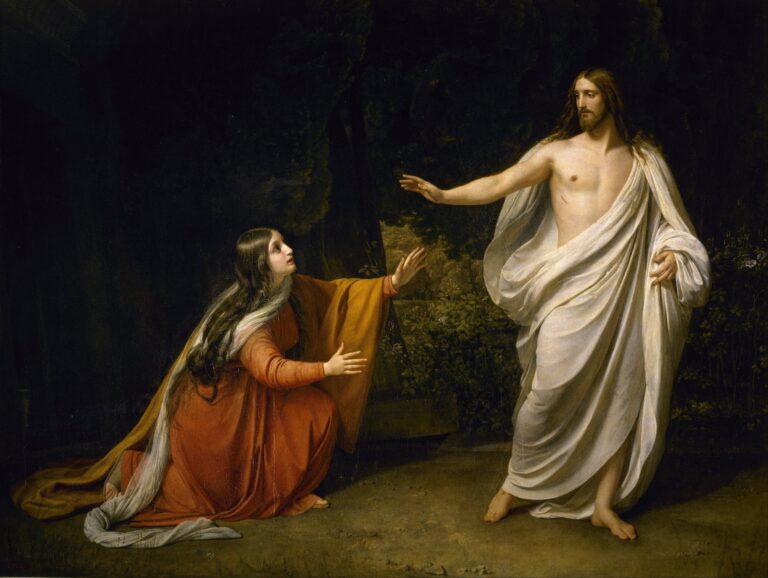Among all the various ministries, there is none more crucial than the ministry of the word. Jesus began his mission by preaching the good news (Mark 1:14–15; Luke 4:16–18), and he sent the first apostles to do the same (Luke 9:2).
At Pentecost, the first thing that happens to the Spirit-filled followers of Jesus is that they begin to speak in all different languages about God’s deeds of power (Acts 2:1–11). And when Paul lists the various ministries, first and foremost are apostles, prophets, and teachers (1 Cor 12:28).
Traditions
The New Testament and other early Christian traditions give us abundant evidence of women who were preachers, teachers, prophets, and evangelisers in the early days of the Jesus movement. Luke’s Gospel opens with prophetic women preaching powerfully liberating words.
Mary, the mother of Jesus, praises God for past saving deeds and proclaims the way toward peace and well-being for all (Luke 1:46–55). Her Magnificat is still recited and sung daily by Christians worldwide.
Elizabeth proclaims that there is blessedness in the most difficult of circumstances (Luke 1:39–45) and that God’s delight is in taking away affliction (1:25). And at the circumcision and naming of her son, her proclamation of God’s grace (the literal meaning of her son’s name is “grace of God”) has the effect of bringing her husband to fuller faith, enabling him to speak again and to praise God.
Not only that, but Elizabeth’s words cause all those present and people all throughout the hill country of Judea to marvel at God’s mighty deeds (Luke 1:59– 66). The prophet Anna, who kept vigil in the temple for eighty-four years, continuously preached hope to all who were looking for redemption (Luke 2:36–38).
Mary Magdalene and the other Galilean women who followed Jesus and ministered with him were the first to be commissioned by him to preach the good news (Matt 28:1–10; John 20:1–2, 11–18).
The Samaritan woman preached to her townspeople, who came to believe in Jesus because of her word (John 4:39). In Orthodox tradition, she is named Photina, “Enlightened One”, and is said to be “equal to the apostles”.
Junia, a relative of Paul, was “prominent among the apostles”, presumably preaching far and wide, as did Paul, and for which she pays the price of imprisonment with him (Rom 16:7). Phoebe, diakonos of the Church of Cenchreae, would undoubtedly have overseen and shared in the preaching to and evangelising of this harbour community at the port of Corinth (Rom 16:1–3). Prisca, along with her husband Aquila, must have herself been a prominent preacher and teacher, as she explained more accurately the way of God to Apollos, an eloquent preacher from Alexandria (Acts 18:26).
Euodia and Syntyche worked mightily alongside Paul in evangelising at Philippi (Phil 4:2–3). While neither their names nor the content of their proclamations are preserved, Philip’s four daughters were prophets (Acts 21:9), as were a number of Corinthian women (1 Cor 11:5).
Preachers
Extracanonical traditions preserve the memory of women itinerant preachers such as Thecla and Nino. The Acts of Thecla, for example, written in Asia Minor in the late second century, tells of how Thecla, a rich aristocratic woman from Iconium, renounced her family, fortune, and fiance to join Paul in his apostolic mission, preaching to both men and women. Devotion to her became widespread throughout Asia Minor and Egypt, particularly among women, who saw her as a model of empowerment.
Another woman venerated in the Orthodox Church as “equal of the apostles” is Nino or Nina. Juvenal, the first patriarch of Jerusalem (451–458), gave her a cross and commissioned her to evangelise wherever she might go. She made her way to Georgia (ancient Iberia), making converts of all who heard her preaching, including Queen Nana, and eventually King Mirian, who declared Christianity the official religion.
Just as these early women followers of Jesus took to heart his commission to preach the good news, so women have continued to do throughout Christian history. Women disciples know that our charism to preach is grounded in our baptism and confirmation. Gifted further with theological education, pastoral experience, and a listening heart, we can do no less than share this gift as widely as we can.
While inadequate interpretations of scripture and patriarchal understandings of the order of creation and of ecclesial structures currently continue to restrict women’s ability to exercise the preaching ministry, the Spirit always finds a way for the word to be preached.
These preachers represent a vast array of communities of believers of diverse races, geographic areas, economic strata, sexual orientations, and cultures. And whether physical or spiritual mothers, each does as Pope Francis urges in Evangelii Gaudium, “the Church . . . preaches in the same way that a mother speaks to her child. . . . Just as all of us like to be spoken to in our mother tongue, so too, in the Faith we like to be spoken to in our ‘mother culture’ . . . and our heart is better disposed to listen”.
As you listen with the ear of your heart to the wisdom of women, may you, too, be emboldened to preach the word with persistence at all times and in all ways.
This is an extract from the book Catholic Women Preach – Raising Voices, Renewing the Church, a collection of homilies by women. Published by Orbis Books and reproduced with kind permission.



